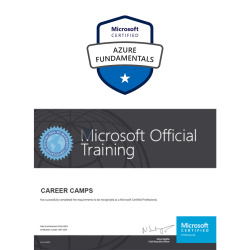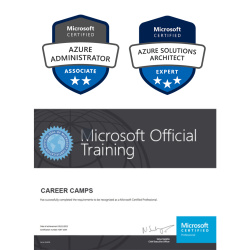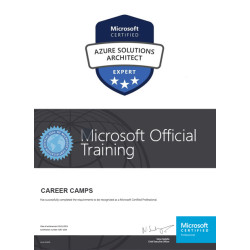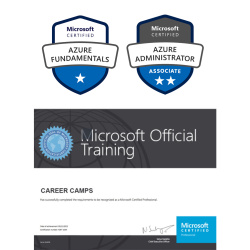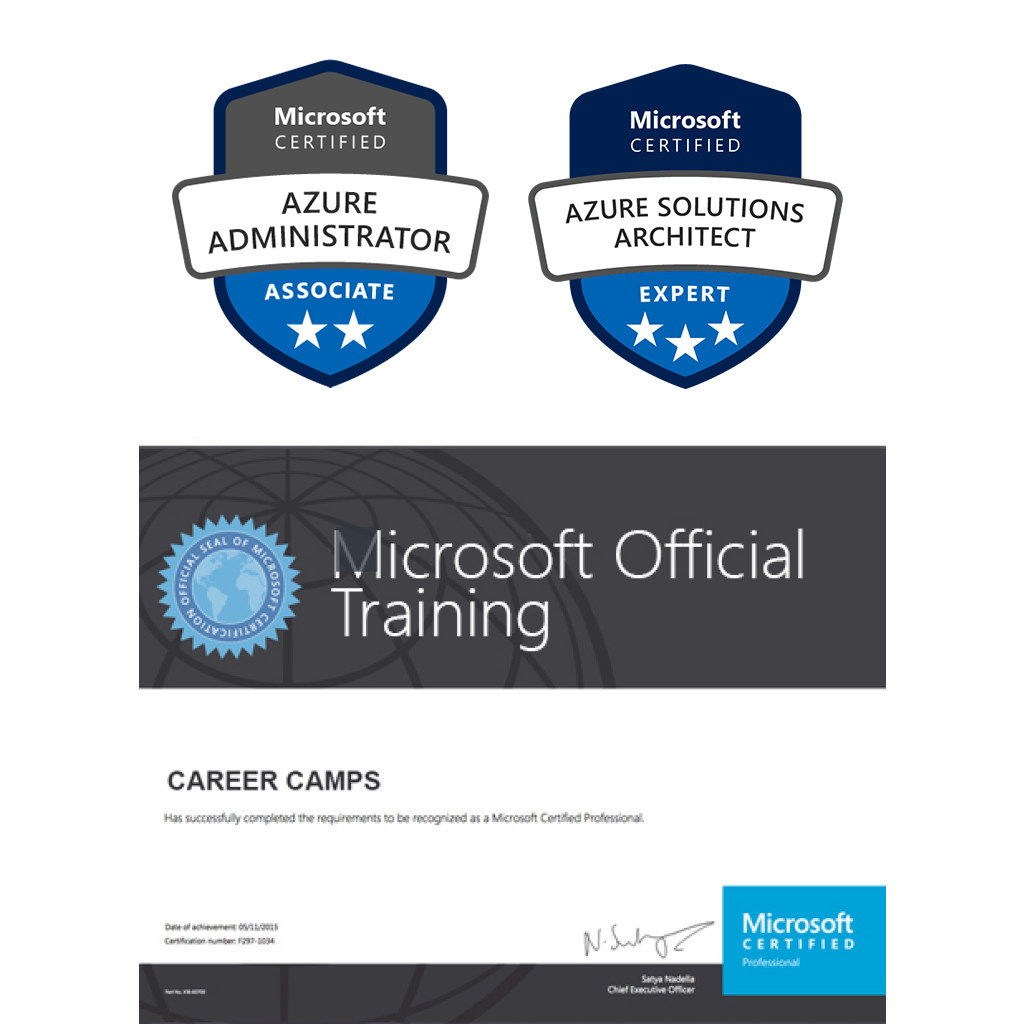
MCA Microsoft Azure Admin (w/ Foundations) + MCE Solutions Architect COMBO Certification Camp (3 Courses, 3 Exams, 3 Certifications)
$5,995.00
Attend this boot camp to become both a Microsoft Azure Administrator and a Solutions Architect.
Students will take three certification exams — AZ-900 (Azure Fundamentals), AZ-104 (Azure Administrator), and AZ-305 (Designing Microsoft Infrastructure Solutions) — to earn the Microsoft Certified: Azure Administrator Associate (MCA) and Microsoft Certified: Azure Solutions Architect Expert (MCE) credentials.
This hands-on, live instructor-led training is designed to reflect the real-world responsibilities of Azure Administrators and Solutions Architects. It also thoroughly prepares students for the certification exams, which are taken during the camp.
We also offer the MCA Microsoft Azure Admin + MCE Solutions Architect Accelerated COMBO Certification Camp and the MCA Microsoft Azure Admin (w/ Azure Foundations) Certification Camp.
EXAMS INCLUDED
AZ-900: Microsoft Azure Fundamentals
AZ-104: Microsoft Azure Administrator
AZ-305: Designing Microsoft Infrastructure Solutions
WHAT IS INCLUDED
| Airfare to/from Sarasota, FL | |
| 10 Nights of Lodging | |
| Ground Transportation | |
| Microsoft Training Books | |
| 3 Microsoft Exam Vouchers | |
| 1 Retake Voucher (per exam, if needed) | |
| Onsite Pearson Vue Test Center | |
| Microsoft Study Labs & Simulations |
LOCATIONS
Career Camps primary Microsoft Training campus (for individual students) is located in Sarasota, FL. Can’t travel to our facility? No problem! You will save on airfare, lodging and transportation. Just contact us and we will get you pricing to attend the class online live virtually from your work or home. If you do not see the location or class you are looking for, let us know! We have access to hundreds of classes and locations all across the United States and also offer corporate and group rates. If you have 5 or more students we can even come to you! With several partnerships in place, we are sure to have something to fit your needs. Whether you need to get MCA or MCE Certified, or get updated on Microsoft Windows Server 2022, we’ve got you covered.
Description
Please note – there will be no class on Sunday (middle of camp)
As of April 1st, 2022 – Microsoft requires the MCA Azure Admin to achieve the MCE Azure Solutions Architect Expert certification. This comprehensive 10-day boot camp combines training for the Azure Fundamentals, Azure Administrator, and Azure Solutions Architect Expert certifications into a single, streamlined program. The course emphasizes real-world tasks involved in implementing, monitoring, and maintaining Azure solutions, covering core services such as compute, storage, networking, and security. Students will also gain the skills needed to advise stakeholders and translate business requirements into secure, scalable, and reliable cloud solutions.
While attending this 10 day camp – students will take three exams (AZ-900 / AZ-104 / AZ-305) to achieve the Microsoft Certified Associate Azure Administrator & Microsoft Certified Expert Azure Solutions Architect certifications. This hands-on, live instructor-led training equips participants with the skills to both administer and architect Microsoft Azure environments, while also preparing them for the certification exams, which are taken during the course.
The Microsoft Certified Azure Administrator Associate boot camp is taught using Microsoft Official Courseware –
AZ-900T00: Microsoft Azure Fundamentals
AZ-104T00: Microsoft Azure Administrator
AZ-305T00: Designing Microsoft Azure Infrastructure Solutions
Skills Gained:
Describe cloud concepts
Describe core Azure services
Describe core solutions and management tools on Azure
Describe general security and network security features
Describe identity, governance, privacy, and compliance features
Describe Azure cost management and Service Level Agreements
Manage Azure identities and governance
Implement and manage storage
Deploy and manage Azure compute resources
Configure and manage virtual networking
Monitor and back up Azure resources
Manage Azure identities and governance
Implement and manage storage
Deploy and manage Azure compute resources
Configure and manage virtual networking
Monitor and back up Azure resources
Design identity, governance, and monitoring solutions
Design data storage solutions
Design business continuity solutions
Design infrastructure solutions
Topics Covered in this Official Boot Camp:
Describe core Azure concepts
In this module, you’ll take an entry level end-to-end look at Azure and its capabilities, which will provide you with a solid foundation for completing the available modules for Azure Fundamentals.
Lessons
Introduction to Azure fundamentals
Discuss Azure fundamental concepts
Describe core Azure architectural components
After completing this module, students will be able to:
Understand the benefits of cloud computing in Azure and how it can save you time and money
Explain concepts such as high availability, scalability, elasticity, agility, and disaster recovery
Describe core Azure architecture components such as subscriptions, management groups, resources and
Summarize geographic distribution concepts such as Azure regions, region pairs, and availability zon
Describe core Azure services
In this module, you learn about core Azure services like Azure database, Azure compute, Azure storage, and Azure Networking.
Lessons
Explore Azure database and analytics services
Explore Azure compute services
Explore Azure Storage services
Explore Azure networking services
After completing this module, students will be able to:
Understand the breadth of services available in Azure including compute, network, storage, and datab
Identify virtualization services such as Azure Virtual Machines, Azure Container Instances, Azure Ku
Compare Azure’s database services such as Azure Cosmos DB, Azure SQL, Azure Database for MySQL, Azur
Examine Azure networking resources such as Virtual Networks, VPN Gateways, and Azure ExpressRoute
Summarize Azure storage services such Azure Blob Storage, Azure Disk Storage, and Azure File Storage
Describe core solutions and management tools on Azure
In this module, you’ll learn about AI machine learning, Azure DevOps, monitoring fundamentals, management fundamentals, serverless computing fundamentals. and IoT fundamentals.
Lessons
Choose the best AI service for your needs
Choose the best tools to help organizations build better solutions
Choose the best monitoring service for visibility, insight, and outage mitigation
Choose the best tools for managing and configuring your Azure environment
Choose the best Azure serverless technology for your business scenario
Choose the best Azure IoT service for your application
After completing this module, students will be able to:
Choose the correct Azure Artificial Intelligence service to address different kinds of business chal
Choose the best software development process tools and services for a given business scenario.
Choose the correct cloud monitoring service to address different kinds of business challenges.
Choose the correct Azure management tool to address different kinds of technical needs and challenge
Choose the right serverless computing technology for your business scenario.
Choose the best Azure IoT service for a given business scenario.
Describe general security and network security features
In this module, you will learn how to protect yourself against security threats, and secure your networks with Azure.
Lessons
Protect against security threats on Azure
Secure network connectivity on Azure
After completing this module, students will be able to:
Strengthen your security posture and protect against threats by using Azure Security Center.
Collect and act on security data from many different sources by using Azure Sentinel.
Manage dedicated physical servers to host your Azure VMs for Windows and Linux by using Azure Dedica
Identify the layers that make up a defense in depth strategy.
Explain how Azure Firewall enables you to control what traffic is allowed on the network.
Configure network security groups to filter network traffic to and from Azure resources within a Mic
Explain how Azure DDoS Protection helps protect your Azure resources from DDoS attacks.
Describe identity, governance, privacy, and compliance features
In this module, you will learn about Azure identity services, how to build a cloud governance strategy, and privacy, compliance and data protection standards on Azure.
Lessons
Secure access to your applications by using Azure identity services
Build a cloud governance strategy on Azure
Examine privacy, compliance, and data protection standards on Azure
After completing this module, students will be able to:
Explain the difference between authentication and authorization.
Describe how Azure Active Directory provides identity and access management.
Explain the role single sign-on (SSO), multifactor authentication, and Conditional Access play.
Make organizational decisions about your cloud environment by using the CAF for Azure.
Define who can access cloud resources by using Azure role-based access control.
Apply a resource lock to prevent accidental deletion of your Azure resources.
Apply tags to your Azure resources to help describe their purpose.
Control and audit how your resources are created by using Azure Policy.
Enable governance at scale across multiple Azure subscriptions by using Azure Blueprints.
Explain the types of compliance offerings that are available on Azure.
Gain insight into regulatory standards and compliance on Azure.
Explain Azure capabilities that are specific to government agencies.
Describe Azure cost management and service level agreements
In this module, you will learn how to plan and manage Azure costs, and how to choose the right Azure services though SLAs and service lifecycle.
Lessons
Plan and manage your Azure costs
Choose the right Azure services by examining SLAs and service lifecycle
After completing this module, students will be able to:
Use the Total Cost of Ownership Calculator.
Describe the different ways you can purchase Azure products and services.
Use the Pricing calculator to estimate the monthly cost of running your cloud workloads.
Define the major factors that affect total cost and apply recommended practices to minimize cost.
Describe what a service-level agreement (SLA) is and why SLAs are important.
Identify factors, such as the service tier you choose, that can affect an SLA.
Combine SLAs to compute a composite SLA.
Describe the service lifecycle in Azure.
Identity
In this module, you will learn how to secure identities with Azure Active Directory, and implement users and groups.
Lessons
Azure Active Directory
Users and Groups
Lab : Manage Azure Active Directory Identities
After completing this module, students will be able to:
Secure and manage identities with Azure Active Directory.
Implement and manage users and groups.
Governance and Compliance
In this module, you will learn about managing your subscriptions and accounts, implementing Azure policies, and using Role-Based Access Control.
Lessons
Subscriptions and Accounts
Azure Policy
Role-based Access Control (RBAC)
Lab : Manage Subscriptions and RBAC
Lab : Manage Governance via Azure Policy
After completing this module, students will be able to:
Implement and manage Azure subscriptions and accounts.
Implement Azure Policy, including custom policies.
Use RBAC to assign permissions.
Azure Administration
In this module, you will learn about the tools an Azure Administrator uses to manage their infrastructure. This includes the Azure Portal, Cloud Shell, Azure PowerShell, CLI, and Resource Manager Templates. This module includes:
Lessons
Azure Resource Manager
Azure Portal and Cloud Shell
Azure PowerShell and CLI
ARM Templates
Lab : Manage Azure resources by Using the Azure Portal
Lab : Manage Azure resources by Using ARM Templates
Lab : Manage Azure resources by Using Azure PowerShell (optional)
Lab : Manage Azure resources by Using Azure CLI (optional)
After completing this module, students will be able to:
Leverage Azure Resource Manager to organize resources.
Use the Azure Portal and Cloud Shell.
Use Azure PowerShell and CLI.
Use ARM Templates to deploy resources.
Virtual Networking
In this module, you will learn about basic virtual networking concepts like virtual networks and subnetting, IP addressing, network security groups, Azure Firewall, and Azure DNS.
Lessons
Virtual Networks
IP Addressing
Network Security groups
Azure Firewall
Azure DNS
Lab : Implement Virtual Networking
After completing this module, students will be able to:
Implement virtual networks and subnets.
Configure public and private IP addressing.
Configure network security groups.
Configure Azure Firewall.
Configure private and public DNS zones.
Intersite Connectivity
In this module, you will learn about intersite connectivity features including VNet Peering, Virtual Network Gateways, and Site-to-Site Connections.
Lessons
VNet Peering
VPN Gateway Connections
ExpressRoute and Virtual WAN
Lab : Implement Intersite Connectivity
After completing this module, students will be able to:
Configure VNet Peering.
Configure VPN gateways.
Choose the appropriate intersite connectivity solution.
Network Traffic Management
In this module, you will learn about network traffic strategies including network routing and service endpoints, Azure Load Balancer, and Azure Application Gateway.
Lessons
Network Routing and Endpoints
Azure Load Balancer
Azure Application Gateway
Lab : Implement Traffic Management
After completing this module, students will be able to:
Configure network routing including custom routes and service endpoints.
Configure an Azure Load Balancer.
Configure and Azure Application Gateway.
Azure Storage
In this module, you will learn about basic storage features including storage accounts, blob storage, Azure files and File Sync, storage security, and storage tools.
Lessons
Storage Accounts
Blob Storage
Storage Security
Azure Files and File Sync
Managing Storage
Lab : Manage Azure storage
After completing this module, students will be able to:
Create Azure storage accounts.
Configure blob containers.
Secure Azure storage.
Configure Azure files shares and file sync.
Manage storage with tools such as Storage Explorer
Azure Virtual Machines
In this module, you will learn about Azure virtual machines including planning, creating, availability and extensions.
Lessons
Virtual Machine Planning
Creating Virtual Machines
Virtual Machine Availability
Virtual Machine Extensions
Lab : Manage virtual machines
After completing this module, students will be able to:
Plan for virtual machine implementations.
Create virtual machines.
Configure virtual machine availability, including scale sets.
Use virtual machine extensions.
Serverless Computing
In this module, you will learn how to administer serverless computing features like Azure App Service, Azure Container Instances, and Kubernetes.
Lessons
Azure App Service Plans
Azure App Service
Container Services
Azure Kubernetes Service
Lab : Implement Web Apps
Lab : Implement Azure Container Instances
Lab : Implement Azure Kubernetes Service
After completing this module, students will be able to:
Create an app service plan.
Create a web app.
Implement Azure Container Instances.
Implement Azure Kubernetes Service.
Data Protection
In this module, you will learn about backing up files and folders, and virtual machine backups.
Lessons
File and Folder Backups
Virtual Machine Backups
Lab : Implement Data Protection
After completing this module, students will be able to:
Backup and restore file and folders.
Backup and restore virtual machines.
Monitoring
In this module, you will learn about monitoring your Azure infrastructure including Azure Monitor, alerting, and log analytics.
Lessons
Azure Monitor
Azure Alerts
Log Analytics
Network Watcher
Lab : Implement Monitoring After completing this module, students will be able to:
Use Azure Monitor.
Create Azure alerts.
Query using Log Analytics.
Use Network Watcher.
Design Governance and Compute Solutions
In this module you will learn about governance and compute solutions.
Lesson
Design a governance solution
Design a compute solution
Lab : Case studies
After completing this module, students will be able to:
Design a governance solution.
Design a compute solution.
Design Storage and Data Integration Solutions
In this module, you will learn about non-relational storage, relational storage, and data integration solutions.
Lesson
Design a non-relational storage solution
Design a relational storage solution
Design a data integration solution
Lab : Case studies
After completing this module, students will be able to:
Design a non-relational storage solution.
Design a relational storage solution.
Design a data integration solution.
Design App Architecture, Access, and Monitoring Solutions
In this module you will learn about app architecture, authentication and authorization, and logging and monitoring solutions.
Lesson
Design an app architecture solution
Design authentication and authorization solutions
Design a logging and monitoring solution
Lab : Case studies
After completing this module, students will be able to:
Design an app architecture solution.
Design authentication and authorization solutions.
Design a logging and monitoring solution.
Design Network, Continuity, and Migration Solutions
In this module you will learn about networking, business continuity, and migration solutions.
Lesson
Design a network infrastructure solution
Design a business continuity solution
Design a migration solution
Lab : Case studies
After completing this module, students will be able to:
Design a networking infrastructure solution.
Design a business continuity solution.
Design a migration solution.
Additional information
| Class Dates | 03/02/2026 – 03/13/2026 – Sarasota, FL |
|---|
Our Facilities
CAREER CAMPS FACILITIES

CLASSROOM EQUIPMENT – Students work on a dedicated Dell Client Desktop with 32GB memory with 512GB SSD drives – All Labs are executed the extremely fast Microsoft Data Center Hosted Lab Environment.
CAMPUS INTERNET – The campus is connected with a 1Gbps (1,000 Mbps) Verizon Fios Business Connection which provides complete internet (including VPN) access for students.
COMMON AREA – Amenities including snacks, drinks (Coffee, 100% juices, sodas, etc) all complimentary.
LODGING – We use the Hyatt Place Lakewood Ranch. This “upgraded” hotel offers extremely comfortable beds, great breakfast and very fast internet access.
NEAR BY AMENITIES – Many shops, restaurants and grocery options are available within walking distance. Additionally – the hotel provided scheduled shuttle services. Restaurants like Bone Fish Grill, Ruby Tuesday’s, Five Guys, Chipotle, Quiznos, Chili’s and over 20 additional choices in the immediate area. All of these options are offered in a pedestrian walking village.
Why Choose Us
CAREER CAMPS DIFFERENCE
Career Camps provides an in-depth hands on learning environment. Our instructors teach using demonstrations and explain concepts beyond the scope of the courseware. The best instructors are contracted from all across the US. These professionals are real world consultants who actually implement these technologies. Career Camps knows our clients work in the “real world” and it only makes sense to have an instructor with the experience in the real world.
Facilities – Many of our competitors over-crowd classrooms by placing 2 to 3 students per desk and 20+ students per instructor. Often these companies “extend” the life of very old equipment with slow performance on the software used today. Our average class size is 8 students. Our facilities have the best equipment with the most comfortable, focused environment for learning.
Instructors – Our CEO, Chester Flake holds one of the rarest Microsoft Certifications – the Microsoft Certified Learning Consultant (MCLC) Certification. This certification reflects a commitment to make sure our instructors are also actively engaged in real world consulting projects. Students expect a professional who can answer questions and demonstrate the technology.
Face to Face Training – We believe the best way to interact and learn is face to face training. Many of our competitors which offer local training are simply providing students with headphones/mic to attend class with an instructor at a remote location.
Test Pass – We offer a free retake voucher (if needed) for each of the exams required for certification. Any training center offering a “100% pass guarantee” would have to use unethical practices or unlimited test vouchers (which is not likely or practical).
Distractions – Students often look for a “local” training center so they can be close to home and work. Boot camp requires a tremendous time commitment during the program. Long class hours combined with self study each evening. The goal of boot camp is to achieve certification in a fraction of the time. We strongly recommend students attend camp away from home and work in a focused, distraction free environment.
Boot Camp – Boot camp is an accelerated training focused on teaching technology and testing students on the official exams. Most training providers “added” boot camps to the existing standard training classes they offer. These training centers think a boot camp is just a regular class where you send the student home with a voucher on the last day. Career Camps administers exams throughout the camp. Equally important – not every trainer can teach a boot camp and not all courseware is designed for boot camp format. Our trainers know the boot camp format and our courseware is designed for accelerated learning.
Florida – Career Camps has one of the most scenic locations boasting some of the best weather in US. We believe students should have a comfortable and inviting atmosphere while attending these otherwise intense programs. We place our location, facilities and amenities up against that any competitor.
Microsoft Azure Certifications
Microsoft Job Role-based Azure Certifications
Microsoft has aligned Azure certifications and training to job roles – focusing on Admin, Dev or Architect.
Each certification requires 2 exams and no certification has any prerequisite certification requirements.
You May Also Like:
Related products
-
Azure Fundamentals Certification Camp (1 Course, 1 Exam, 1 Cert)
$995.00 Select options This product has multiple variants. The options may be chosen on the product page -
MCA Microsoft Azure Admin + MCE Solutions Architect Accelerated COMBO Certification Camp (2 Courses, 2 Exams, 2 Certs)
$4,995.00 Select options This product has multiple variants. The options may be chosen on the product page -
MCE Microsoft Azure Solutions Architect Certification Camp (1 Course, 1 Exam, 1 Cert)
$2,995.00 Select options This product has multiple variants. The options may be chosen on the product page -
MCA Microsoft Azure Admin (w/ Azure Foundations) Certification Camp (2 Courses, 2 Exams, 2 Certs)
$4,495.00 Select options This product has multiple variants. The options may be chosen on the product page


